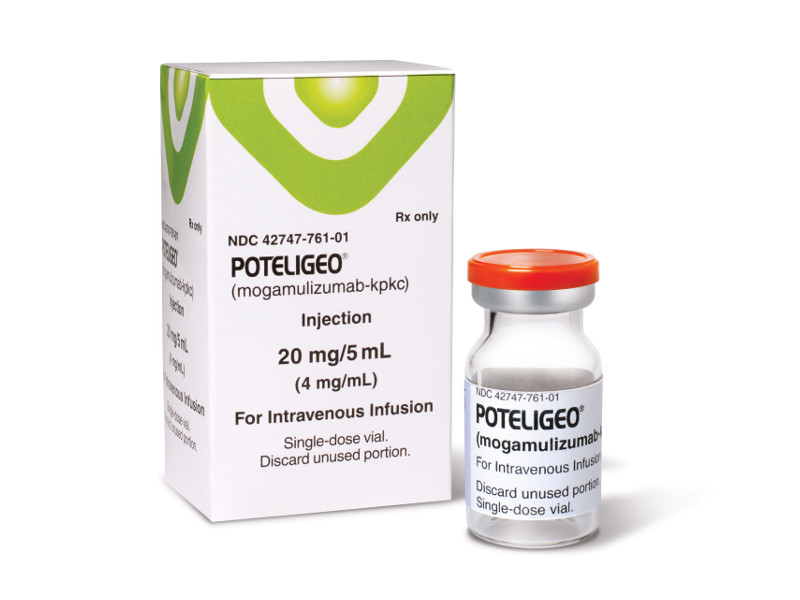Keytruda (pembrolizumab) vs Poteligeo (mogamulizumab)
Keytruda (pembrolizumab) vs Poteligeo (mogamulizumab)
Keytruda (pembrolizumab) is an immune checkpoint inhibitor that targets the PD-1 pathway and is widely used for various types of cancer, including melanoma, non-small cell lung cancer, and head and neck cancer, among others. Poteligeo (mogamulizumab), on the other hand, is a monoclonal antibody that targets CCR4 and is specifically approved for the treatment of certain types of cutaneous T-cell lymphoma (CTCL), such as mycosis fungoides and Sézary syndrome. When deciding between Keytruda and Poteligeo, it is crucial to consider the specific type of cancer being treated, as each medication is tailored to different targets and mechanisms of action, and their effectiveness can vary significantly depending on the cancer subtype.
Difference between Keytruda and Poteligeo
| Metric | Keytruda (pembrolizumab) | Poteligeo (mogamulizumab) |
|---|---|---|
| Generic name | Pembrolizumab | Mogamulizumab |
| Indications | Various types of cancers including melanoma, lung cancer, head and neck cancer, Hodgkin lymphoma, and more | Relapsed or refractory mycosis fungoides or Sézary syndrome |
| Mechanism of action | PD-1 inhibitor that blocks the interaction between PD-1 and its ligands, PD-L1 and PD-L2 | CCR4 antagonist that targets malignant T-cells |
| Brand names | Keytruda | Poteligeo |
| Administrative route | Injection (IV) | Injection (IV) |
| Side effects | Fatigue, musculoskeletal pain, decreased appetite, pruritus, diarrhea, nausea, rash, pyrexia, cough, dyspnea, constipation, pain in extremity, and headache | Infusion reactions, skin rash, fatigue, diarrhea, musculoskeletal pain, and upper respiratory tract infection |
| Contraindications | Individuals with hypersensitivity to pembrolizumab or any of its excipients | Individuals with hypersensitivity to mogamulizumab or any of its excipients |
| Drug class | Anti-PD-1 monoclonal antibody | Anti-CCR4 monoclonal antibody |
| Manufacturer | Merck & Co. | Kyowa Kirin |
Efficacy
Keytruda (Pembrolizumab) Efficacy in Lymphoma
Keytruda, also known by its generic name pembrolizumab, is a monoclonal antibody that has shown efficacy in treating certain types of lymphoma, particularly Hodgkin lymphoma. It is designed to target and block the PD-1 pathway, which some cancer cells use to protect themselves from an attack by the immune system. By inhibiting this pathway, Keytruda can help the immune system to detect and fight cancer cells. Clinical trials have demonstrated that pembrolizumab can induce a significant response in patients with relapsed or refractory classical Hodgkin lymphoma, even in cases where patients have failed multiple previous therapies.
However, the efficacy of Keytruda can vary based on the subtype of lymphoma and the individual patient's disease characteristics. In clinical settings, response rates and duration of response have been important metrics for assessing the effectiveness of pembrolizumab in lymphoma. It is also important to note that the U.S. Food and Drug Administration (FDA) has approved Keytruda for use in certain lymphoma cases, reflecting its recognized therapeutic benefit in this context.
Poteligeo (Mogamulizumab) Efficacy in Lymphoma
Poteligeo, with the generic name mogamulizumab, is a monoclonal antibody used in the treatment of certain types of lymphoma, specifically adult T-cell leukemia/lymphoma (ATL) and mycosis fungoides (MF) and Sézary syndrome (SS), which are types of cutaneous T-cell lymphomas (CTCL). Mogamulizumab targets the C-C chemokine receptor 4 (CCR4) expressed on the surface of some cancer cells, which plays a role in tumor growth and survival. By binding to CCR4, Poteligeo can induce cell death and has been shown to improve progression-free survival in patients with relapsed or refractory CTCL.
The efficacy of Poteligeo in treating lymphoma has been supported by clinical trials, where it has shown to provide benefit to patients with CTCL, leading to its approval by regulatory agencies such as the FDA. The drug's effectiveness is often measured by the reduction in disease symptoms and the duration of the response in patients. Despite its benefits, the response to Poteligeo can be variable, and it is currently indicated for patients who have received at least one prior systemic therapy.
Regulatory Agency Approvals
Keytruda
-
European Medical Agency (EMA), European Union

-
Food and Drug Administration (FDA), USA

-
Health Canada

-
Therapeutic Goods Administration (TGA), Australia

-
Medsafe (NZ)

Poteligeo
-
European Medical Agency (EMA), European Union

-
Food and Drug Administration (FDA), USA

-
Therapeutic Goods Administration (TGA), Australia

Access Keytruda or Poteligeo today
If Keytruda or Poteligeo are not approved or available in your country (e.g. due to supply issues), you can access them via Everyone.org.
How it works

Make an enquiry
Choose the medicine you want to buy, answer a couple of questions, and upload your prescription to speed things up. We’ll get back to you within 24 hours.


Make an enquiry
Choose the medicine you want to buy, answer a couple of questions, and upload your prescription to speed things up. We’ll get back to you within 24 hours.


Breeze through the paperwork
We'll guide you through the required documents for importing unapproved medicine, ensuring you have all the necessary information.


Get a personalized quote
We’ll prepare a quote for you, including medicine costs and any shipping, administrative, or import fees that may apply.


Receive your medicine
Accept the quote and we’ll handle the rest - sourcing and safely delivering your medicine.

Some text on this page has been automatically generated. Speak to your physician before you start a new treatment or medication.
Let's talk
If you have any questions, call us or send us a message through WhatsApp or email:
Contact us




